The Daily Bulletin is published by Internal and Leadership Communications, part of University Communications
Contact us at bulletin@uwaterloo.ca
Submission guidelines
Editor:
Brandon Sweet
University Communications
bulletin@uwaterloo.ca
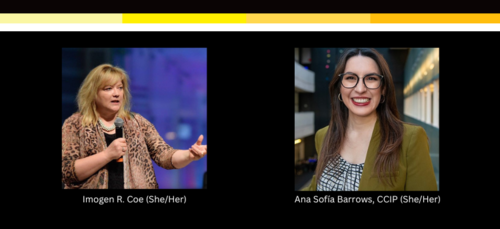
A message from the Office of Research.
On Thursday afternoon, Imogen R. Coe, PhD and Ana Sofía Barrows, CCIP, will deliver a workshop for Waterloo researchers, “Creating Inclusive Excellence in Research through Inclusive Leadership.” Recognized as leaders in the field of equity, diversity and inclusion, they will guide attendees through interactive sessions that will impart teachings about systemic barriers in research and how they limit innovation, creativity and diverse approaches to complex problems, in addition to sharing tools and strategies for identifying and removing barriers to inclusion, creating cultures of care that attract, retain and promote diverse talent and enhance impact and rigour in all research activities.
This event will take place in Fed Hall from 1:00 p.m. to 4:00 p.m. on Thursday, April 13. Please register to attend.
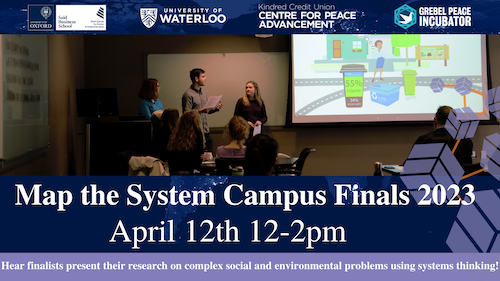
A message from Conrad Grebel University College.
Map the System Campus Finals are approaching! Five finalist teams from across UWaterloo will present their systemmaps exploring complex social and environmental problems and compete for cash prizes.
Map the System is a global competition run by the Skoll Centre for Social Entrepreneurship in partnership with Oxford University and other post-secondary institutions around the world. In this competition, participants use systems thinking as a guiding approach to explore some of the most complex issues facing the world today.
The event takes place from 12 noon to 2:00 p.m. on Wednesday, April 12 in the Conrad Grebel Great Hall. A light lunch will be provided.
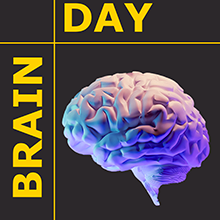 The Centre for Theoretical Neuroscience is presenting Brain Day 2023 on Tuesday, April 11.
The Centre for Theoretical Neuroscience is presenting Brain Day 2023 on Tuesday, April 11.
"The University of Waterloo's Centre for Theoretical Neuroscience supports the development of robust explanatory theories of mind and brain through education and research," says a note from the CTN. "In pursuit of that goal, the CTN has invited four internationally renowned speakers to present generally accessible lectures from each of the perspectives of neuroscience, computational neuroscience, psychology, and philosophy on the ideas of mind, brain, theories, and models."
The event starts with coffee and a light breakfast in E7 2472 at 8:30 a.m. Welcoming remarks begin at 9:00 a.m. with speaker sessionsn running until 4:15 p.m. in E7 3353.
Speakers include Rafal Bogacz of the University of Oxford, Dora Angelaki of New York University, Natasha Rajah of McGill University, and Serife Tekin of the University of Texas at San Antonio.
A reception will follow the event in E7 2742.

New research reveals that math can help people identify the bonds of friendship.
The work from the University of Waterloo found that people use statistical information to determine bonds between people. It found that children as young as five can enter a room and use statistics on social cues to determine whether two people are friends.
“The ability to discern whether other people are likely to be affiliated is crucial in everyday life,” said Ori Friedman, co-author and professor of developmental psychology at the University of Waterloo. “When an adult joins a new workplace, or a child joins a new classroom, these judgments help them assess whether people are friends.”
Across five studies, the researchers surveyed 528 adults and 135 children to examine their use of statistical information when assuming people have a social relationship. In the studies, researchers presented participants with diagrams of social networks that showed lines drawn between two main characters and other people in the group. Participants were told that these lines indicated friendship, and importantly, researchers did not show a line connecting the two main characters. Researchers then asked participants how likely it was that the two main characters were friends.
“Past research has shown that children and adults infer social connections when people have similarities with each other, but our research is the first to test how people predict social connections using only statistical information,” said Claudia Sehl, lead author and PhD candidate in the Department of Psychology at Waterloo.
The researchers found that both children and adults thought the two main characters were friends when they had a lot of overlap in their social connections in common. This pattern was found in children as young as five years old, suggesting that the ability to consider social connections emerges early in development.
“We were surprised to see that children were able to infer social connectedness at such a young age,” said Sehl. “We did not tell children to count or think about the number of mutual connections, yet children were able to use complex statistical information to learn about relationships spontaneously.”
Sehl adds that participants were also able to conclude the strength of social connections from the size of the network. For example, when a character had many mutual connections with someone with a smaller network, participants saw this as more meaningful than having many mutual connections with someone with a larger social network.
The researchers plan to build on these findings and explore whether these inferences also generalize to other non-social networks.
The paper, The Social Network: How People Infer Relationships From Mutual Connections, authored by Friedman, Sehl and Waterloo professor Stephanie Denison, appears in the Journal of Experimental Psychology.
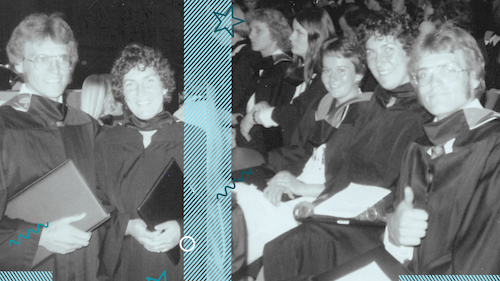
By Megan Vander Woude. This article was originally published on Waterloo News.
Years ago, when Nancy (BA ’78) and Allan McCalder (BA ’78) came back to the University of Waterloo for a tour, they knew their kids needed to see the computer.
If you were also a Waterloo student in the 1960s or 70s, you probably understand why. At that time, the Math and Computer building (MC) housed the largest computer in Canada, the IBM 360 Model 75. It was housed in the centre of MC, and any student or passerby could peer in through the windows to see its gigantic size.
“The whole main floor was a computer,” says Nancy. “It was humungous. We said to our boys, ‘We’ve got to see this computer.’ They loved computers, and so we went to the math building and looked in the room.”
Nancy and Allan were shocked at what they saw.
“It had shrunk! It was a quarter of the size that it used to be. I remember it so distinctly — it was so funny — because the technology had changed so much.”
That was just one memorable change they discovered on campus, and the McCalders expect to see more this spring when they return for their 50th class reunion. In June, they’ll make the trip from Edmonton, Alberta to reunite with old friends in person.
Nancy and Pam Graham (BA ’77) have worked together to organize the event. While much of the class has stayed in touch over the years, this gathering will be special. They plan to join in with other class reunion celebrations at Alumni Weekend, plus they have some private activities too — a meet-and-greet in the new Health building, a campus tour, golf games and an outing to the St. Jacob’s Farmer’s Market. Pam also arranged a tour of Kitchener-Waterloo.
While they take in all the changes, Nancy hopes the visit will also spark some memories. She looks back on her time as a student fondly: “We were a unique class I think. At one point, there were seven or eight couples, and a group of the boys lived together in [the townhouse community] Sunnydale. They were real catalysts in pulling the class together for parties and other activities. My husband ended up living with them for a summer.”
On campus, Nancy remembers everyone gathering for lunch: “I remember going to the South Campus Hall (SCH) cafeteria, or the campus centre pub. Actually, that’s where my husband and I had our first date.”
Looking back, that date was a good lesson for Nancy, who reluctantly took a break from studying to meet Allan for drinks. “He phoned me up and asked me to go out, and I’m thinking, ‘For God’s sake, it’s the middle of exams,’” she says. “I needed to learn to have some recreation before my exams. Anyway, we went and it was great.”
So great that the pair got married just before they finished their degrees. After graduation, they moved to Alberta, but have managed to stay in touch with their classmates. Over 50 years, much of the group has stayed in touch, holding annual gatherings at Christmas and in the summer. When COVID removed the possibility of in-person gatherings, they started meeting on Zoom every Saturday. Those calls continue today, and that’s where the group started talking about a 50th reunion.
Whether on Zoom or on campus, Nancy cherishes the time she has with her class. “I think it’s important because it’s part of my history. We had a really powerful shared experience and it’s wonderful to stay connected, to be part of each others’ lives.”
Register for Alumni Weekend in June
Well, that's all she wrote - almost. The winter term has come to an end as temperatures are set to rise this week. Today is a make-up day on a Friday schedule for lectures and classes, to make up for the lack of a Friday class due to the Good Friday holiday. Up next are pre-examination study days on Tuesday, April 11 and Wednesday, April 12, with the examination period kicking off on Thursday, April 13 and running until Friday, April 28, which is also the end of the winter co-operative work term. Whew!
So, what else is going on?
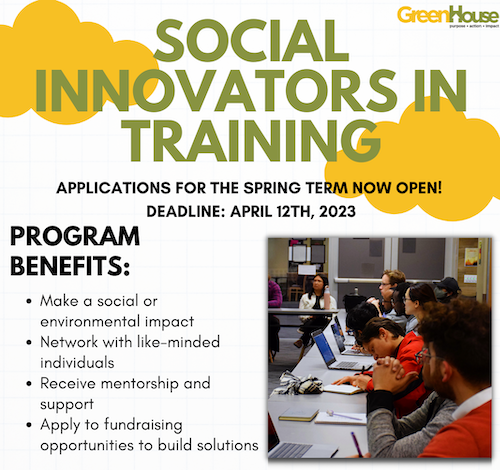
United College's "Social Innovators In Training" program is accepting applications for the spring term.
"Have an idea? Don't know where to start? Need help with networking? Funding opportunities? We have the answers to all those questions and more," says a note from United College's GreenHouse. "The Social Innovators in Training program is going to run from May 10 to June 28 for the spring term."
"You get to work with like-minded innovators and build relationships with mentors that will benefit you in growing your venture," says GreenHouse.
Applications are now open until Wednesday, April 12.
Plant Operations reports that steam services will be shut down in Doug Wright Engineering (DWE) for about six hours today. The work on the steam system started at 8:00 a.m. this morning and will last for about 6 hours today. During the shutdown, no heating, humidification, or autoclave use will be available.
Plant Operations is also reporting that elevators will be out of commission in Math 3 on Thursday, April 13 as inspections are carried out. Only one elevator at a time will be out of service during maintenance.
 The Waterloo Institute for Sustainable Energy (WISE) will be hosting a public lecture entitled The Grid of the Future: How smart grids, decentralized energy resources, and new business models can help us reach a Net Zero Grid by 2035” on Friday, April 20. Speaking will be Faisal Kazi, President and CEO of Siemens Canada.
The Waterloo Institute for Sustainable Energy (WISE) will be hosting a public lecture entitled The Grid of the Future: How smart grids, decentralized energy resources, and new business models can help us reach a Net Zero Grid by 2035” on Friday, April 20. Speaking will be Faisal Kazi, President and CEO of Siemens Canada.
"With electricity demand expected to increase by as much as 85 per cent by 2050, it’s imperative that we rethink our energy systems and how we interact with them if we want to reach Canada’s goal to have a net zero grid by 2035," says the talk's abstract. "Smart Grid Atlantic Research Project is doing just that. By utilizing smart grid technology, distributed energy resources (DERs,) and innovative business models like crowd sourcing, private sector companies like Siemens and local utilities can work together to ensure an economically viable energy transition creating smart energy communities with cleaner and more reliable electricity."
The event takes place Friday, April 20, from 11:00 a.m. to 12:30 p.m., in Engineering 7 7303/7363.
25 years ago: The Good Friday Agreement
Students can visit the Student Success Office online for supports including academic development, international student resources, immigration consulting, leadership development, exchange and study abroad, and opportunities to get involved.
Instructors looking for targeted support for developing online components for blended learning courses, transitioning remote to fully online courses, revising current online courses, and more please visit Agile Development | Centre for Extended Learning | University of Waterloo (uwaterloo.ca).
Faculty, staff, post-doc and graduate student instructors can find upcoming teaching and learning workshops, self-directed modules and recordings of previous events on Centre for Teaching Excellence Workshops and Events page.
Instructors can access the EdTech Hub to find support on Waterloo’s centrally supported EdTech tools. The Hub is supported by members of IST’s Instructional Technologies and Media Services, Centre for Teaching Excellence, Centre for Extended Learning and subject matter experts from other campus areas.
Supports are available for employees returning to campus. Visit IST’s Hybrid Work and Technology guidelines and workplace protocols to assist with the transition.
Students with permanent, temporary and suspected disabilities and disabling conditions (medical conditions, injuries, or trauma from discrimination, violence, or oppression) can register with AccessAbility Services for academic accommodations (classroom accommodations, testing accommodations, milestone accommodations).
Instructors can visit AccessAbility Services' Faculty and Staff web page for information about the Instructor/Faculty role in the accommodation process. Instructors/Faculty members are legally required to accommodate students with disabilities. AccessAbility Services (AAS) is here to help you understand your obligations, and to offer services and resources to help you facilitate accommodations.
Did you know that the Writing and Communication Centre offers many in-person and virtual services to support you with any writing or communication project? This term we've added The Write Spot: a new student space in South Campus hall, complete with bookable workspaces, drop-ins with our peer tutors, and free coffee and tea. We also have one-to-one appointments with our writing and communication advisors and peer tutors, email tutoring for grads and undergrads, drop-ins at Dana Porter Library, online workshops, writing groups, English conversation practice, and even custom in-class workshops. For any communication project, the Writing and Communication Centre is here to support you.
Research Ethics: Find yourself with an ethical question, unsure if your work requires an ethics review, or need advice about putting together a research ethics application? Reach out to one of our friendly staff by booking a consultation or email us with your questions.
Co-op students can get help finding a job and find supports to successfully work remotely, develop new skills, access wellness and career information, and contact a co-op or career advisor.
The Centre for Career Action (CCA) has services and programs to support undergrads, grad students, postdocs, alumni, and employees in figuring out what they value, what they’re good at, and how to access meaningful work, co-op, volunteer, or graduate/professional school opportunities. Questions about CCA's services? Live chat, call 519-888-4047, or stop by our front desk in the Tatham Centre 8:30 a.m. to 4:30 p.m., Monday to Friday.
Drop-in to in-person Warrior Study Halls on Thursdays from 5:00 p.m. to 6:30 p.m. in DC and DP. Join a Peer Success Coach to set goals and work independently or in groups each week.
Renison's English Language Institute continues to offer virtual events and workshops to help students practice their English language skills.
If you feel overwhelmed or anxious and need to talk to somebody, please contact the University’s Campus Wellness services, either Health Services or Counselling Services. You can also contact the University's Centre for Mental Health Research and Treatment. Good2Talk is a post-secondary student helpline available to all students.
The Library is here to help, both in person and online. Our spaces are open for access to book stacks, study spaces, computers/printers, and the IST Help Desk. For in-depth support, meet one-to-one with Librarians, Special Collections & Archives and Geospatial Centre staff. Visit the Library’s home page to access our online resources for anywhere, anytime learning and research.
The Faculty Association of the University of Waterloo (FAUW) continues to advocate for its members. Check out the FAUW blog for more information.
The University of Waterloo Staff Association (UWSA) continues to advocate for its members. Check out the UWSA blog for more information.
The Office of Equity, Diversity, Inclusion & Anti-racism (EDI-R) works with students, faculty and staff across campus to advance equity and anti-racism through evidence-based policies, practices and programs. If you have a concern related to anti-racism and/or equity, please complete our intake form.
The Sexual Violence Prevention and Response Office (SVPRO) supports all members of the University of Waterloo campus community who have experienced, or been impacted, by sexual violence. This includes all students, staff, faculty and visitors on the main campus, the satellite campuses, and at the affiliated and federated Waterloo Institutes and Colleges. For support, email: svpro@uwaterloo.ca or visit the SVPRO website.
The Office of Indigenous Relations is a central hub that provides guidance, support, and resources to all Indigenous and non-Indigenous campus community members and oversees the University's Indigenization strategy.
The Waterloo Indigenous Student Centre, based at United College, provides support and resources for Indigenous students, and educational outreach programs for the broader community, including lectures, and events.
WUSA supports for students:
Peer support - MATES, Glow Centre, RAISE, Women’s Centre - Click on one of the links to book an appointment either in person or online for the term.
Food Support Service food hampers are currently available from the Turnkey Desk 24/7 in the Student Life Centre. Drop-off locations are also open again in SLC, DC, DP, SCH, and all residences.
Co-op Connection all available online.
Centre for Academic Policy Support - CAPS is here to assist Waterloo undergraduates throughout their experience in navigating academic policy in the instances of filing petitions, grievances and appeals. Please contact them at caps@wusa.ca.
WUSA Student Legal Protection Program - Seeking legal counsel can be intimidating, especially if it’s your first time facing a legal issue. The legal assistance helpline provides quick access to legal advice in any area of law, including criminal. Just call 1-833-202-4571.
Empower Me is a confidential mental health and wellness service that connects students with qualified counsellors 24/7. They can be reached at 1-833-628-5589.
GSA-UW supports for graduate students:
The Graduate Student Association (GSA-UW) supports students’ academic and social experience and promotes their well-being.
Advising and Support - The GSA advises graduate students experiencing challenges and can help with navigating university policies & filing a grievance, appeal, or petition.
Mental Health covered by the Health Plan - The GSA Health Plan now has an 80 per cent coverage rate (up to $800/year) for Mental Health Practitioners. Your plan includes coverage for psychologists, registered social workers, psychotherapists, and clinical counselors.
Dental Care - The GSA Dental Plan covers 60 to 70 per cent of your dental costs and by visiting dental professionals who are members of the Studentcare Networks, you can receive an additional 20 to 30 per cent coverage.
Student Legal Protection Program - Your GSA fees give you access to unlimited legal advice, accessible via a toll-free helpline: +1-833-202-4571. This advice covers topics including housing disputes, employment disputes, and disputes with an academic institution.
The Graduate House: Open Monday to Tuesday 11:30 a.m. to 7:00 p.m. and Wednesday to Friday 11:30 a.m. to 9:00 p.m. We’re open to all students, faculty, staff, and community members. The Graduate House is a community space run by the GSA-UW. We’re adding new items to the menu. Graduate students who paid their fees can get discounts and free coffee.
Fitness and Personal Training - Registrations opened January 5 this winter with Personal Training and Small Group Training as well as a Free Warrior Workout Program.
Waterloo Warriors Youth Camps. Spring and Summer camps available for Boys and Girls ages 5-18. Baseball, Basketball, Football, Volleyball, Hockey and Multi-Sport and Games. Register today.
Student Health Pharmacy in the basement of the Student Life Centre is now offering Covid booster shots (Pfizer and Moderna) and flu shots. Call 519-746-4500 or extension 33784 for an appointment. Walk-ins always welcome.
Lectures and classes end, Monday, April 10. Please note: The loss of Friday classes on April 7 will be made up by following a Friday schedule on Monday, April 10.
Waterloo Staff Conference, Tuesday, April 11 and Wednesday, April 12.
NEW - Pre-examination study days, Tuesday, April 11 and Wednesday, April 12.
NEW - The Centre for Theoretical Neuroscience presents Brain Day 2023, Tuesday, April 11, 8:30 a.m. to 5:30 p.m., E7 3353. Coffee and light breakfast, 8:30 a.m. in E7 2472, reception to follow event in E7 2742.
President’s Forum: Waterloo at 100, Tuesday, April 11, 1:15 p.m. to 2:15 p.m., Humanities Theatre. Staff registration. Faculty registration.
Webinar: Disability Justice for 2SLGBTQIA+ Employees, Wednesday, April 12, 12 noon to 1:00 p.m.
NEW - Public Talk featuring Waterloo AI expert Pascal Poupart, “From AlphaGO to ChatGPT”, Wednesday, April 12, 1:30 p.m. to 3:00 p.m., DC 1350.
NEW - Recycling Battery Materials: Aiming for Net Zero, Wednesday, April 12, 3:30 p.m. to 4:30 p.m., E7 7303-7663
NEW - Final examination period, Thursday, April 13 to Friday, April 28.
NEW - Creating Inclusive Excellence in Research through Inclusive Leadership, Thursday, April 13, 1:00 p.m. to 4:00 p.m. Federation Hall, University of Waterloo. Waterloo researchers are invited to register for the workshop.
Share how you experience the UWaterloo campus in the Inclusive Physical Space Framework survey for a chance to win a $50.00 on a WatCard. Survey closes midnight on Friday, April 21.
NEW - Call for Expressions of Interest: Canada Biomedical Research Fund and Biosciences Research Infrastructure Fund (CBRF-BRIF), due Thursday, April 27. Learn more about the process.
The Daily Bulletin is published by Internal and Leadership Communications, part of University Communications
Contact us at bulletin@uwaterloo.ca
Submission guidelines
The University of Waterloo acknowledges that much of our work takes place on the traditional territory of the Neutral, Anishinaabeg, and Haudenosaunee peoples. Our main campus is situated on the Haldimand Tract, the land granted to the Six Nations that includes six miles on each side of the Grand River. Our active work toward reconciliation takes place across our campuses through research, learning, teaching, and community building, and is co-ordinated within the Office of Indigenous Relations.